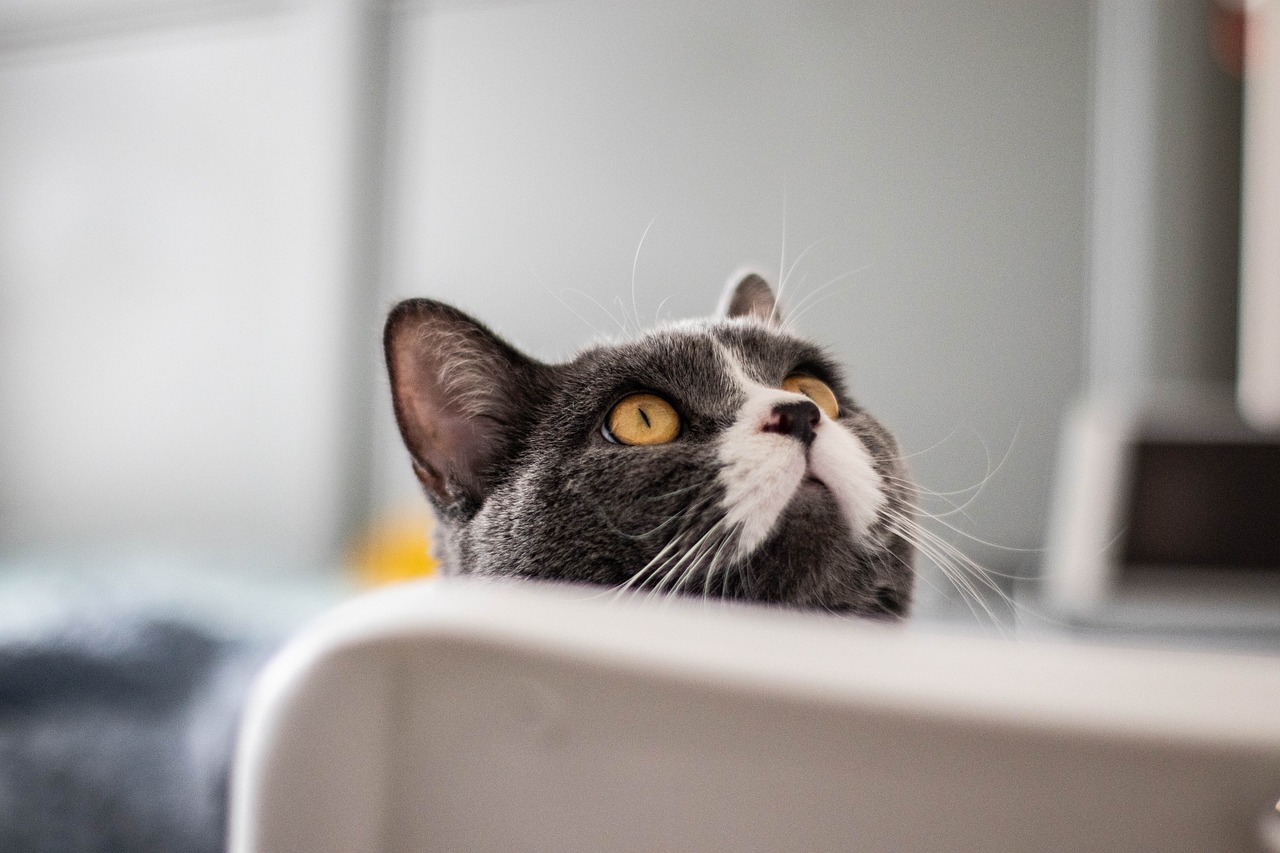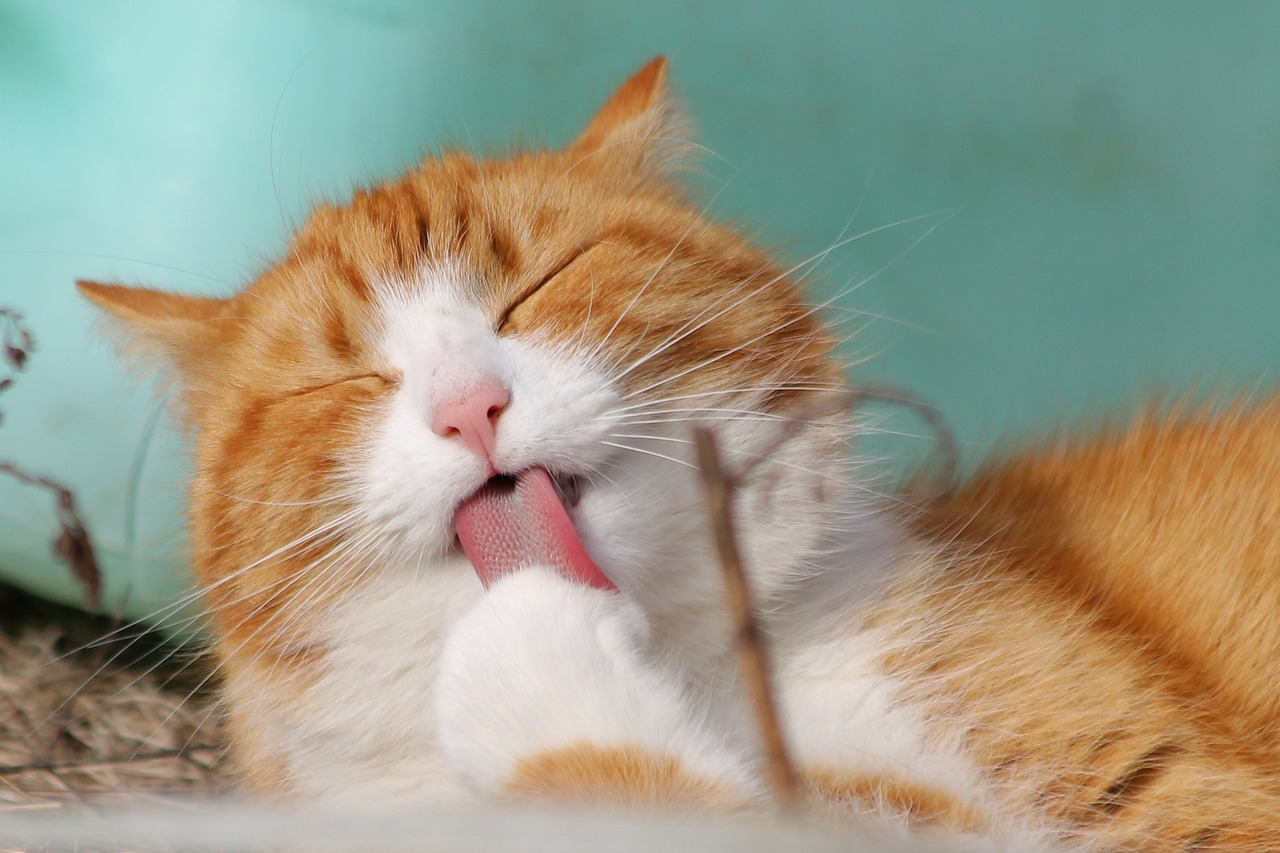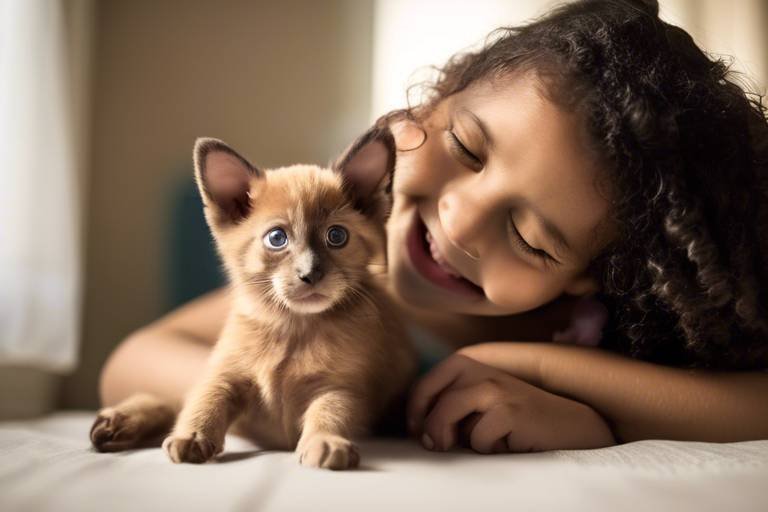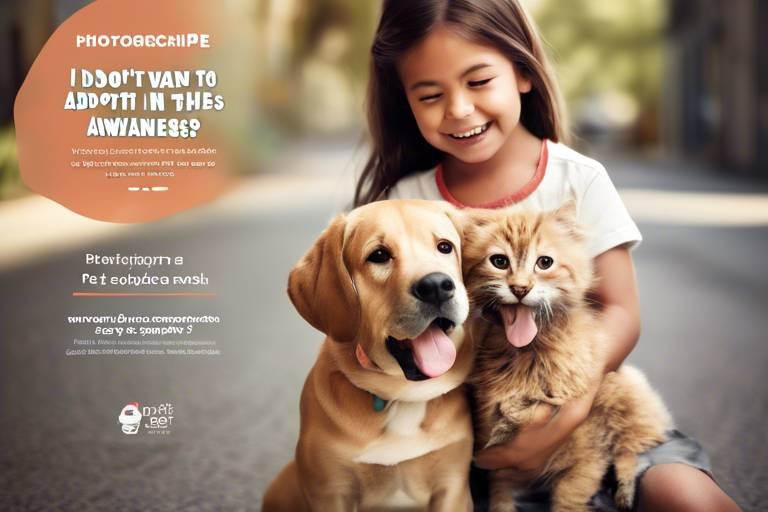The Emotional Impact of Adopting a Rescue Cat
Adopting a rescue cat is not just about bringing home a furry friend; it’s about transforming your life in ways you never imagined. These delightful creatures, often overlooked, have the power to fill our homes with joy, love, and companionship. Imagine coming home after a long day, only to be greeted by a gentle purr and a warm nuzzle. It's those simple moments that can melt away the stress of the day and remind us of the beauty of unconditional love. The emotional impact of adopting a rescue cat extends far beyond mere companionship; it can lead to profound changes in our mental and emotional well-being.
Rescue cats often come with their own stories of resilience and survival, and when we choose to adopt them, we become part of that story. This mutual bond fosters a unique relationship characterized by trust and affection, which can significantly enhance our mental health. The act of saving a cat not only gives them a second chance at life but also enriches our lives in unexpected ways. It's like finding a missing piece of a puzzle that you didn't even know was incomplete. This article delves into the emotional benefits of adopting a rescue cat, showcasing how these furry companions can bring joy, healing, and a sense of purpose into our lives.
Throughout this journey, we’ll explore how the bond between humans and cats can lead to emotional healing, the therapeutic benefits of cat ownership, and how the simple act of caring for a rescue cat can teach us invaluable life lessons. From reducing feelings of loneliness to promoting mindfulness and emotional resilience, the impact of a rescue cat is truly profound. So, if you’ve ever considered adopting a cat, or if you’re already a proud cat parent, this exploration will resonate with you on many levels.
Understanding the unique connection that develops between humans and rescue cats can reveal the emotional depth of this relationship, showcasing mutual affection and trust that enhances mental well-being. When you adopt a rescue cat, you’re not just saving a life; you’re also inviting a new friend into your world. This friendship is built on shared experiences, understanding, and a bond that grows stronger over time. Cats have an incredible ability to sense our emotions, often providing comfort when we need it the most. It’s as if they have an innate understanding of our feelings, and their presence can be incredibly soothing.
Many cat owners describe their pets as emotional support animals, and it’s easy to see why. The companionship of a rescue cat can help alleviate feelings of loneliness and isolation. Whether it’s curling up on the couch together or engaging in playful antics, these moments create lasting memories and a sense of belonging. Moreover, the responsibility of caring for a rescue cat fosters a nurturing environment that can lead to personal growth. It’s a two-way street: as you provide love and care, you receive it back tenfold in the form of purrs, head bumps, and the warmth of a furry body beside you.
Adopting a rescue cat can facilitate emotional healing, providing comfort and companionship to individuals facing loneliness, depression, or anxiety, ultimately improving their overall mental health. The simple act of petting a cat can release endorphins, the feel-good hormones that promote happiness and reduce stress. When you interact with a rescue cat, you’re not just playing; you’re engaging in a therapeutic practice that can uplift your spirits and enhance your emotional well-being.
Rescue cats serve as loyal companions, offering emotional support and reducing feelings of isolation, which can significantly enhance the quality of life for their owners. It’s like having a best friend who’s always there, ready to listen without judgment. When the world feels overwhelming, the presence of a cat can be a comforting reminder that you’re not alone. Their playful antics can bring laughter and joy, turning even the dullest days into something special.
The soothing sound of a cat's purr has been shown to promote relaxation and reduce stress, making it an essential aspect of the emotional support provided by rescue cats. It’s almost like having a built-in stress reliever. The vibrations from a cat’s purr can create a calming atmosphere, helping to lower anxiety and encourage a sense of peace. Just imagine curling up with your rescue cat, listening to the gentle rhythm of their purring while you unwind after a hectic day. It’s a simple yet profound experience that can have lasting effects on your emotional health.
Interacting with a rescue cat encourages mindfulness, as their playful and curious nature invites owners to engage in the present moment, fostering a sense of peace and contentment. When you play with your cat or simply watch them explore their surroundings, you’re drawn into the now, letting go of worries about the past or future. This practice of being present can significantly improve your mental clarity and emotional stability, making it easier to navigate life’s challenges.
The responsibility of caring for a rescue cat can help individuals build emotional resilience, teaching valuable lessons in empathy, patience, and unconditional love. These lessons are not just beneficial for the cat; they can also enrich your life in countless ways. Caring for a pet requires commitment and understanding, and through this journey, you learn to appreciate the small victories and the importance of nurturing relationships. It’s a beautiful cycle of giving and receiving that fosters growth and emotional strength.
Research indicates that owning a rescue cat can lead to numerous therapeutic benefits, including reduced stress levels, lower blood pressure, and improved emotional stability. The presence of a cat can create a serene environment, helping you to feel grounded and secure. It’s like having a little guardian by your side, reminding you to take a breath and enjoy the moment.
The presence of a cat can significantly lower stress levels, providing a calming influence that helps owners cope with daily challenges and emotional turbulence. Studies have shown that interacting with pets can lead to lower cortisol levels, the hormone associated with stress. Just imagine coming home to a soft purring ball of fur that instantly makes your worries fade away. It’s a simple yet powerful remedy for life’s ups and downs.
Rescue cats are increasingly used in therapy settings, where their gentle nature and ability to connect with humans can enhance therapeutic outcomes and support emotional healing in various populations. From schools to hospitals, the presence of cats in therapeutic environments has proven to be beneficial. They create a sense of calm and connection, allowing individuals to open up and engage in the healing process. It’s a beautiful testament to the power of love and companionship that rescue cats bring into our lives.
- What are the benefits of adopting a rescue cat?
Adopting a rescue cat can provide companionship, reduce stress, and improve emotional well-being. It also gives a cat a second chance at life. - How can a cat help with loneliness?
Cats offer unconditional love and companionship, helping to alleviate feelings of isolation and providing emotional support. - Are there any health benefits to owning a cat?
Yes, studies show that cat ownership can lead to lower blood pressure, reduced stress levels, and improved emotional stability. - Can cats sense their owner’s emotions?
Absolutely! Cats are known for their ability to sense human emotions and often provide comfort when their owners are feeling down.

The Bond Between Humans and Cats
The bond between humans and cats is one of the most profound relationships that can develop in our lives. When you adopt a rescue cat, you’re not just bringing home a pet; you’re welcoming a new family member who can profoundly impact your emotional landscape. This connection is often built on trust and affection, which can enhance your mental well-being in ways you might not even realize. Just think about it: how many times have you come home after a long day and felt an instant wave of relief when you see your furry friend waiting for you? Their presence alone can make the burdens of the day feel a little lighter.
Understanding this unique connection involves recognizing how cats communicate their love and loyalty. While they may not always show it in the same way dogs do, cats have their own subtle ways of expressing their feelings. For example, when a cat rubs against you or kneads your lap, it’s a sign of affection and comfort. In return, the emotional support they offer can be incredibly healing. It’s a mutual relationship where both parties benefit from companionship. In fact, studies show that the emotional bond between humans and their feline friends can lead to lower levels of stress and anxiety.
Moreover, the bond can also be described as a dance of reciprocity. You provide a safe haven for your rescue cat, and in return, they offer you companionship and love. This relationship can be especially important for those who may feel isolated or alone. The act of caring for a cat can give you a sense of purpose and responsibility, which can be incredibly fulfilling. It’s a cycle of giving and receiving that enhances emotional health. As you nurture your cat, you’ll find that they nurture you right back, creating a beautiful symbiosis of love and support.
Additionally, the bond can be enriched through shared experiences. Whether it’s playing with a feather toy, curling up together on the couch, or simply enjoying each other's company in silence, these moments build a deep emotional connection. Cats, with their quirky personalities and playful antics, often have a way of making us laugh and bringing joy into our lives. So, if you’re looking for a companion that can lift your spirits and offer emotional support, a rescue cat might just be the perfect fit for you.
In conclusion, the bond between humans and cats is not just about having a pet; it’s about forming a relationship that can significantly enhance your emotional well-being. By adopting a rescue cat, you’re opening the door to a world of companionship, trust, and unconditional love that can transform your life for the better.

Adopting a rescue cat is not just about providing a home for an animal in need; it's also a profound journey of emotional healing for the adopter. Many individuals who find themselves grappling with feelings of loneliness, depression, or anxiety discover that a furry companion can be a remarkable source of comfort. Imagine coming home after a long day, feeling the weight of the world on your shoulders, and being greeted by a soft purring ball of fur. That simple act can transform your mood and remind you that you are not alone. The emotional bond that forms between humans and rescue cats can create a sanctuary of love and support, where both parties thrive.
The act of caring for a rescue cat can instill a sense of purpose and responsibility, which is especially beneficial for those who may feel lost or disconnected. When you adopt a cat, you are not only giving them a second chance at life, but you are also opening up a pathway to healing for yourself. The daily rituals of feeding, grooming, and playing with your cat can provide structure and routine, which are essential for mental well-being. It’s like having a little therapist at home, always ready to listen without judgment and offer companionship.
Furthermore, the emotional support provided by rescue cats can be especially significant during tough times. For instance, studies have shown that petting a cat can release oxytocin, often referred to as the "love hormone," which promotes feelings of bonding and affection. This biochemical response can help reduce feelings of anxiety and promote relaxation. The act of simply holding your cat close can create a calming effect, making the world seem a little less overwhelming.
Moreover, the presence of a cat can encourage mindfulness, a practice that has gained popularity for its mental health benefits. When you engage with your cat, whether it's through play or simply watching them explore their environment, you are drawn into the present moment. This focus on the here and now can help alleviate racing thoughts and worries about the future. Every pounce, every playful swat, and even every nap taken in a sunbeam can serve as a gentle reminder to slow down and appreciate the little things in life.
In essence, adopting a rescue cat can be a transformative experience that fosters emotional healing. The companionship, love, and joy they bring into our lives can help us navigate through our struggles, teaching us valuable lessons in empathy and resilience along the way. It's a relationship built on trust and affection, where both the cat and the owner can find solace in one another. So, if you're considering adopting a rescue cat, remember that you’re not just saving a life; you're also embarking on a journey that could significantly enhance your emotional well-being.
- What are the emotional benefits of adopting a rescue cat?
Adopting a rescue cat can provide companionship, reduce feelings of loneliness, and promote emotional healing by fostering a sense of responsibility and routine.
- How do cats help with anxiety and depression?
The presence of a cat can lower stress levels, encourage mindfulness, and release oxytocin, which helps in reducing anxiety and promoting feelings of happiness.
- Can I adopt a rescue cat if I have never owned a pet before?
Absolutely! Many rescue organizations offer support and resources for first-time pet owners to ensure a smooth transition for both you and your new furry friend.
- How can I prepare my home for a rescue cat?
Make sure to create a safe and welcoming environment by removing hazards, providing scratching posts, and setting up a cozy space for your new companion.
Feeling lonely can be one of the most challenging emotions to navigate. It’s like being in a crowded room yet still feeling isolated, as if there’s an invisible barrier separating you from the warmth of companionship. This is where rescue cats come into play, transforming the experience of loneliness into one filled with joy and connection. These furry little friends are not just pets; they become integral parts of our lives, providing comfort and companionship that can alleviate feelings of isolation.
When you adopt a rescue cat, you’re not just saving a life; you’re also creating a bond that can significantly enhance your emotional well-being. Imagine coming home after a long day, feeling the weight of the world on your shoulders. As you walk through the door, your rescue cat greets you with a soft meow and a gentle nudge against your leg. In that moment, the worries of the day begin to dissipate. The presence of a cat can be incredibly soothing, reminding you that you are not alone in this vast world.
Research shows that pets, particularly cats, can have a profound impact on mental health. The simple act of petting a cat can release endorphins, the body’s natural feel-good chemicals. This interaction not only lifts your mood but also creates a sense of purpose and responsibility. Caring for a rescue cat means you have someone who relies on you, which can be a powerful antidote to loneliness. It’s a reminder that you are needed, and that can make all the difference.
Moreover, the playful antics of a rescue cat can bring laughter and joy into your home. Whether it’s chasing a feather toy or curling up in a sunbeam, their quirky behaviors can be a source of endless entertainment. This playfulness encourages you to engage with them, creating opportunities for bonding that can fill your home with warmth and love. Just think about it: how often do you find yourself laughing at your cat’s silly antics? Those moments are not just amusing; they are vital for emotional connection.
In addition, rescue cats have an innate ability to sense their owner's emotions. Many cat owners report that their feline friends seem to know when they’re feeling down and will often snuggle closer or purr softly, providing a sense of comfort and understanding. This intuitive connection can be incredibly healing, making you feel seen and valued even during your toughest days. The bond between humans and cats is a unique one, built on trust, affection, and shared experiences.
Ultimately, adopting a rescue cat is not just about gaining a pet; it’s about inviting a companion into your life who can help bridge the gap of loneliness. They offer a listening ear, a comforting presence, and an endless supply of love. So, if you’re feeling lonely, consider opening your heart and home to a rescue cat. You might just find that they have the power to transform your life in ways you never thought possible.
- How can a rescue cat help with loneliness?
A rescue cat can provide companionship, emotional support, and a sense of purpose, helping to alleviate feelings of loneliness. - What are the benefits of adopting a rescue cat?
Adopting a rescue cat not only saves a life but also brings joy, reduces stress, and fosters emotional connections. - Do rescue cats bond with their owners?
Yes, rescue cats can form strong bonds with their owners, often sensing their emotions and providing comfort during tough times.
The sound of a cat's purr is more than just a charming melody; it is a powerful tool for emotional healing and comfort. When a rescue cat curls up next to you, the rhythmic vibrations of their purring can create a sense of calm that is almost tangible. This gentle sound has been scientifically proven to have a soothing effect on humans, acting like a natural stress reliever. Imagine the feeling of your worries melting away as you listen to this soft, comforting sound—it's like a warm hug for your soul.
Research suggests that the frequency of a cat’s purr, typically between 25 to 150 Hertz, can promote healing in bones and tissues, which is fascinating! It's as if nature has equipped these furry companions with a built-in therapy mechanism. This purring not only helps cats to communicate their contentment but also serves as a therapeutic tool for their human counterparts. When you're feeling overwhelmed or anxious, just petting a purring cat can lead to a significant reduction in stress levels.
Moreover, the act of stroking a cat while they purr can enhance this calming effect. The combination of tactile engagement and auditory stimulation creates a holistic experience that fosters relaxation. It’s almost like a meditative practice, where both the cat and the owner find tranquility in each other's presence. Here are some benefits of purring that highlight its role in comfort:
- Reduces stress: The soothing sound can lower cortisol levels, which are linked to stress.
- Promotes relaxation: Purring encourages the release of endorphins, making you feel happier and more at ease.
- Enhances emotional connection: The shared experience of a cat's purr can deepen the bond between you and your feline friend.
In essence, the purring of a rescue cat is not merely a sign of contentment; it is a profound expression of connection that can bring comfort and healing to those who need it most. Whether you are dealing with the trials of everyday life or navigating deeper emotional struggles, the simple act of sharing space with a purring cat can be a transformative experience. So, the next time you hear that comforting sound, take a moment to appreciate the emotional refuge it offers.
- What does it mean when a cat purrs? Purring usually indicates that a cat is content, but it can also occur when they are in pain or seeking comfort.
- Can purring really help reduce stress? Yes! Studies have shown that the frequency of a cat's purr can help lower stress levels and promote relaxation.
- How can I encourage my cat to purr? Create a calm environment, pet them gently, and spend quality time with them to encourage purring.
This article explores the profound emotional benefits of adopting a rescue cat, highlighting the joy, companionship, and healing that these animals can bring into our lives.
Understanding the unique connection that develops between humans and rescue cats can reveal the emotional depth of this relationship, showcasing mutual affection and trust that enhances mental well-being.
Adopting a rescue cat can facilitate emotional healing, providing comfort and companionship to individuals facing loneliness, depression, or anxiety, ultimately improving their overall mental health.
Rescue cats serve as loyal companions, offering emotional support and reducing feelings of isolation, which can significantly enhance the quality of life for their owners.
The soothing sound of a cat's purr has been shown to promote relaxation and reduce stress, making it an essential aspect of the emotional support provided by rescue cats.
Interacting with a rescue cat encourages mindfulness, as their playful and curious nature invites owners to engage in the present moment, fostering a sense of peace and contentment. Imagine sitting on your couch, your furry friend curled up beside you, purring softly. This simple act can transport you into a state of tranquility, where your worries fade away. The rhythmic sound of their purring becomes a meditation in itself, a gentle reminder to breathe and be present.
Moreover, cats have a knack for drawing our attention to the little things. Whether it’s the way they chase a beam of sunlight or their playful antics with a simple string, these moments can serve as a catalyst for mindfulness. When you watch a cat in action, you’re not just observing; you’re participating in a dance of joy and curiosity. This engagement can help you break free from the cycle of negative thoughts and immerse yourself in the now.
Incorporating your cat into mindfulness practices can be incredibly rewarding. Here are a few ways to do so:
- Mindful Petting: Take a few minutes to focus solely on the act of petting your cat. Feel their fur, notice their breathing, and appreciate the bond you share.
- Playtime as Meditation: Use playtime as an opportunity to let go of distractions. Focus on the joy your cat experiences as they chase after toys, and allow yourself to feel that happiness too.
- Quiet Moments Together: Spend quiet moments with your cat, whether it’s cuddling or simply sitting together. Let the stillness envelop you, and embrace the comfort of their presence.
By integrating these practices into your daily routine, you can cultivate a deeper connection with your rescue cat while enhancing your own emotional well-being. Remember, adopting a cat isn’t just about giving them a home; it’s about inviting a little mindfulness and joy into your life.
The responsibility of caring for a rescue cat can help individuals build emotional resilience, teaching valuable lessons in empathy, patience, and unconditional love.
Research indicates that owning a rescue cat can lead to numerous therapeutic benefits, including reduced stress levels, lower blood pressure, and improved emotional stability.
The presence of a cat can significantly lower stress levels, providing a calming influence that helps owners cope with daily challenges and emotional turbulence.
Rescue cats are increasingly used in therapy settings, where their gentle nature and ability to connect with humans can enhance therapeutic outcomes and support emotional healing in various populations.
Q: How can a rescue cat improve my mental health?
A: Rescue cats can provide companionship, reduce feelings of loneliness, and promote emotional healing through their affectionate behavior and calming presence.
Q: What are some mindfulness practices I can do with my cat?
A: You can engage in mindful petting, playtime as meditation, and enjoy quiet moments together to enhance your emotional connection and promote mindfulness.
Q: Can cats really help with stress reduction?
A: Yes, the presence of a cat has been shown to lower stress levels and provide comfort, making them excellent companions for managing daily challenges.
When we think about the emotional resilience that comes from adopting a rescue cat, we often overlook the profound lessons these furry companions can teach us. Caring for a cat is not just about providing food and shelter; it's about forming a bond that nurtures our emotional growth. Imagine, for a moment, the responsibility of being a pet owner. This responsibility can be akin to holding a mirror up to ourselves, revealing our strengths and weaknesses. In this relationship, we learn patience, empathy, and the art of unconditional love.
Adopting a rescue cat can be a transformative experience. For many, the act of caring for another living being fosters a sense of purpose and belonging. This can be especially important for individuals grappling with emotional challenges. When you take on the responsibility of a cat, you are not just a caretaker; you become a source of comfort and security for that animal. In return, the cat offers companionship that can help soothe feelings of loneliness and despair. It's a beautiful exchange that enriches both lives.
Moreover, the daily routines associated with cat ownership can instill a sense of stability and predictability in our lives. For example, feeding your cat at the same time each day or engaging in playtime can create a rhythm that brings structure to your day. This structure can be particularly beneficial for individuals dealing with anxiety or depression, as it provides a sense of normalcy amid chaos. Here’s a quick look at how adopting a rescue cat can bolster emotional resilience:
| Emotional Benefits | How Cats Help |
|---|---|
| Building Patience | Caring for a cat requires understanding their needs and behaviors, teaching us to be patient. |
| Fostering Empathy | Being attentive to a cat's feelings encourages us to be more empathetic towards others. |
| Encouraging Routine | Daily care routines provide structure, which can help alleviate anxiety. |
| Unconditional Love | Cats offer companionship without judgment, promoting self-acceptance and love. |
In essence, the journey of adopting a rescue cat is not just about saving a life; it's about enriching our own. The emotional resilience we cultivate through this relationship can extend beyond our interactions with our cats, enhancing our relationships with friends, family, and even ourselves. So, the next time you cuddle with your furry friend, remember that you are both on a journey of growth, healing, and resilience. And who knows, the lessons learned from this delightful companionship may just empower you to navigate the ups and downs of life with newfound strength.
- How can a cat help with emotional resilience? Cats provide companionship, teach responsibility, and encourage routines, all of which contribute to emotional strength.
- What are the signs of emotional healing after adopting a cat? Increased happiness, reduced feelings of loneliness, and a greater sense of purpose are common signs.
- Can adopting a rescue cat improve my mental health? Yes, many studies suggest that pet ownership can lead to lower stress levels and improved emotional stability.

When you think about adopting a rescue cat, you might picture cuddly moments and playful antics, but the truth is, the benefits go far beyond just companionship. Owning a rescue cat can significantly enhance your emotional and physical well-being. Research has shown that the bond between humans and their feline friends can lead to a range of therapeutic benefits that can transform your life in ways you never imagined.
For starters, let’s talk about stress reduction. Imagine coming home after a long, exhausting day. The moment you step through the door, your furry friend greets you with a gentle meow and a rub against your leg. Instantly, your worries start to melt away. Studies reveal that simply petting a cat can lower cortisol levels, the hormone associated with stress. This simple act can create a calming atmosphere, helping you to unwind and leave behind the chaos of the day.
But the benefits don’t stop there! Owning a rescue cat can also lead to lower blood pressure. Yes, you read that right! The American Heart Association has found that pet ownership, particularly cats, is linked to lower blood pressure and cholesterol levels. This is not just about having a cute companion; it’s about contributing to your overall heart health. The rhythmic sound of a cat's purring acts like a natural stress reliever, creating a soothing environment that promotes relaxation and tranquility.
Moreover, having a cat can improve your emotional stability. The presence of a rescue cat can help mitigate feelings of anxiety and depression. When you’re feeling down, your cat is there, providing unconditional love and companionship. This emotional support can be incredibly powerful, reminding you that you’re never truly alone. The responsibility of caring for a living being also gives you a sense of purpose, which can be particularly beneficial during tough times.
In addition to these personal benefits, rescue cats are increasingly being integrated into therapy settings. They bring a unique comfort that can enhance therapeutic outcomes. In various programs, rescue cats are used to help individuals dealing with mental health issues, trauma, and even children with behavioral challenges. Their gentle nature and ability to connect with humans make them ideal companions in these sensitive environments. In fact, therapy cats have been known to help reduce anxiety levels in patients and create a more relaxed atmosphere during sessions.
To summarize the therapeutic benefits of cat ownership, consider the following key points:
| Benefit | Description |
|---|---|
| Stress Reduction | Lower cortisol levels through petting and companionship. |
| Lower Blood Pressure | Linked to pet ownership, contributing to heart health. |
| Emotional Stability | Provides companionship and purpose, reducing feelings of loneliness. |
| Therapeutic Use | Enhances therapy outcomes in various settings. |
In conclusion, adopting a rescue cat is more than just a kind act; it’s a step towards improving your emotional and physical health. These furry companions offer a wealth of therapeutic benefits that can enrich your life in countless ways. So, if you’re considering adding a feline friend to your family, remember that you’re not just saving a life; you’re also investing in your own well-being.
- How do cats help reduce stress?
Cats provide companionship and comfort, which can lower cortisol levels, helping you relax. - Can owning a cat really improve my mental health?
Yes! The emotional support from cats can help alleviate feelings of loneliness, anxiety, and depression. - Are therapy cats effective?
Absolutely! Therapy cats are increasingly used in various settings to enhance emotional healing and provide comfort. - What are the health benefits of owning a cat?
Benefits include lower blood pressure, reduced stress levels, and improved emotional stability.
In today's fast-paced world, stress seems to be an unwelcome companion for many of us. But what if I told you that a simple solution could be purring right beside you? That's right! Rescue cats have an incredible ability to help reduce stress levels, acting as furry little therapists who come with unconditional love and a soothing presence. You might wonder, how can such small creatures wield such power? Well, let’s dive into the fascinating ways these cats can enhance our emotional well-being.
First and foremost, the mere presence of a cat can create a calming environment. When you come home after a long, tiring day, there’s nothing quite like the sight of your feline friend stretching out lazily on the sofa, ready to greet you. This simple interaction can trigger a release of oxytocin, the hormone associated with bonding and relaxation. Just petting your cat can lower your heart rate and blood pressure, turning a chaotic day into a peaceful moment.
Moreover, the sound of a cat's purr is like nature's very own stress-relief soundtrack. Research has shown that the frequency of a cat's purr, typically between 25 to 150 Hertz, can promote healing and reduce anxiety. It's as if these creatures have a built-in mechanism for providing comfort. When you listen to that gentle rumble, it’s hard not to feel your worries melt away. The rhythmic sound can lull you into a state of tranquility, akin to how soft music can soothe a restless mind.
Additionally, the act of caring for a cat can be a grounding experience. When you take on the responsibility of feeding, grooming, and playing with your rescue cat, it shifts your focus away from your own stressors. You become present in the moment, engaging with your pet and enjoying the little things, like watching them chase a feather toy or curl up in a sunbeam. This engagement can serve as a form of mindfulness, helping you to stay anchored and reducing feelings of anxiety.
To illustrate the impact of cats on stress reduction, here’s a quick look at some of the benefits:
| Benefit | Description |
|---|---|
| Lower Blood Pressure | Petting a cat can help lower blood pressure, promoting heart health. |
| Reduced Anxiety | The calming presence of a cat can significantly reduce feelings of anxiety. |
| Enhanced Mood | Interacting with a cat can trigger the release of serotonin, improving overall mood. |
In conclusion, adopting a rescue cat not only saves a life but also opens the door to a world of emotional benefits. The stress-reducing qualities of these furry companions are profound, reminding us that sometimes the best therapy comes with four paws and a purr. So, if you're feeling overwhelmed or anxious, consider inviting a rescue cat into your life. You might just find that the love and companionship they offer are the perfect antidote to the stresses of everyday life.
- How do cats help reduce stress? Cats provide companionship and their purring can produce calming effects, lowering blood pressure and anxiety levels.
- Can spending time with a cat improve my mood? Yes! Interacting with a cat can increase serotonin levels, enhancing your overall mood.
- What should I consider before adopting a rescue cat? Consider your lifestyle, the time you can dedicate to the cat, and any allergies or other pets at home.
In recent years, the incorporation of rescue cats into therapy settings has gained significant traction, and for good reason. These furry companions possess a unique ability to connect with individuals, often transcending verbal communication. Imagine walking into a room filled with people who are struggling, and amidst the tension, a gentle cat curls up in someone's lap, instantly softening the atmosphere. This is the magic of therapy cats—they bring a sense of calm and comfort that is hard to replicate.
Therapists have discovered that the presence of cats can create a nurturing environment conducive to healing. Whether it’s in hospitals, nursing homes, or mental health facilities, the soothing presence of a cat can help alleviate anxiety and promote emotional well-being. In many cases, the act of petting a cat can trigger the release of oxytocin, the hormone associated with bonding and affection, which further enhances feelings of happiness and relaxation.
Here are some key aspects of how cats contribute to therapy settings:
- Emotional Connection: Cats have an innate ability to sense human emotions. They often gravitate toward individuals who need comfort, providing a silent yet powerful support system.
- Stress Relief: The simple act of petting a cat can lower cortisol levels, the hormone responsible for stress. This makes therapy sessions more productive and enjoyable.
- Encouraging Interaction: Cats can serve as a catalyst for social interaction. Their playful nature can encourage individuals to engage with each other, fostering a sense of community.
Moreover, therapy cats are often involved in structured programs where they assist in various therapeutic activities. For instance, in group therapy sessions, the presence of a cat can help participants feel more at ease, allowing them to open up and share their feelings. This can be particularly beneficial for those who struggle with social anxiety or communication challenges. The cat becomes a bridge, facilitating dialogue and connection among participants.
In addition to traditional therapy environments, cats are also being used in educational settings, helping children with autism or other developmental disorders. The non-judgmental nature of cats can provide a safe space for these children to express themselves, ultimately enhancing their social skills and emotional understanding. The gentle purring of a cat can create a soothing backdrop that encourages learning and exploration.
As we continue to explore the therapeutic benefits of rescue cats, it’s clear that their role is more than just that of a pet; they are vital partners in healing. Their ability to bring joy, comfort, and emotional support is invaluable, making them an essential part of many therapeutic practices.
- How do therapy cats help with anxiety?
Their presence can lower stress levels and promote relaxation through physical touch and companionship. - Are all cats suitable for therapy work?
No, therapy cats are typically selected for their calm demeanor and sociability with people. - Can therapy cats be used in schools?
Yes, they can help children with emotional and social challenges by providing comfort and encouraging interaction.
Frequently Asked Questions
- What are the emotional benefits of adopting a rescue cat?
Adopting a rescue cat can bring immense emotional benefits, including companionship, joy, and a sense of purpose. These furry friends can help alleviate feelings of loneliness and depression, providing comfort and unconditional love that many people crave.
- How do rescue cats help with loneliness?
Rescue cats are known for their affectionate nature and can be incredibly loyal companions. Their presence can significantly reduce feelings of isolation, offering emotional support that enhances the quality of life for their owners. It's like having a little buddy who’s always there to cheer you up!
- What role does a cat's purr play in emotional healing?
The soothing sound of a cat's purr is not just cute; it has therapeutic effects! Research shows that the vibrations produced by purring can promote relaxation and reduce stress. This comforting sound can create a serene atmosphere, making it easier for owners to unwind after a long day.
- Can owning a cat improve mental health?
Absolutely! Studies indicate that owning a rescue cat can lead to reduced stress levels, lower blood pressure, and improved emotional stability. The responsibility of caring for a pet can also foster emotional resilience, teaching valuable lessons in empathy and patience.
- How can interacting with a rescue cat promote mindfulness?
Engaging with a rescue cat encourages you to be present in the moment. Their playful antics and curious nature invite owners to participate in activities that promote mindfulness, helping to foster a sense of peace and contentment. It's a wonderful way to escape the hustle and bustle of daily life!
- Are rescue cats used in therapy settings?
Yes! Rescue cats are increasingly being utilized in therapy settings due to their gentle disposition and ability to connect with humans. They can enhance therapeutic outcomes and provide emotional support to various populations, making them invaluable in healing environments.



















